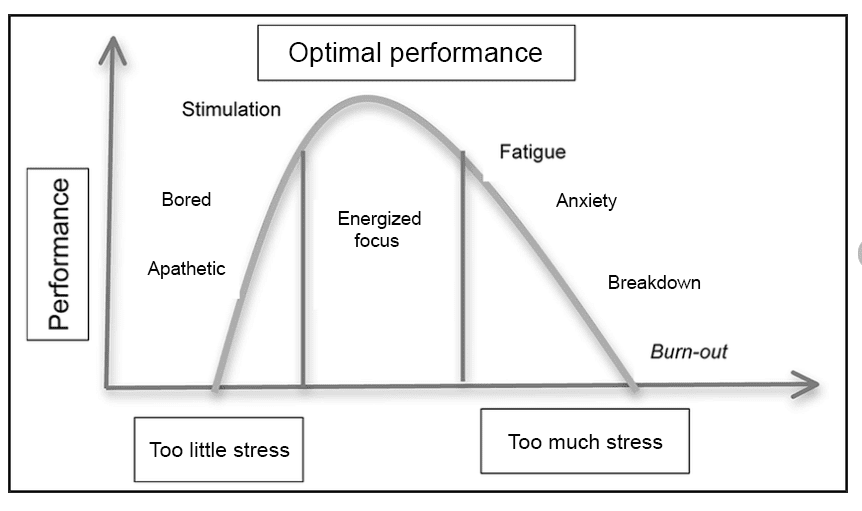
Stress and anxiety
To better understand
Is it normal to feel stressed? Should I be concerned if my teen is experiencing stress? Is there a difference between stress and anxiety? As the parent of a teenager, it’s normal to ask these questions. Here are some answers.
First, rest assured that experiencing stress is completely normal. Stress is a response that everyone experiences at one time or another and teens are no exception. Stress is an alarm signal that allows us to respond to a tangible and real situation that we perceive as being threatening. Too often, we tend to give stress a negative connotation. Yet, it is stress that gives us the energy needed (brain activation response) to handle stressful situations better. Depending on the situation, a stress response can be fight (overcome the fear), flight of freeze. For example, it would be normal for your teen to feel stressed following a move that involves changing schools or during their first driving course. It’s this same stress that allows them to react, find solutions and appropriately cope with the situation.
The same situation may be stressful for one teen and not another. It depends on, among other things, their personality and their past experiences. How we respond to stress affects our thoughts (what we tell ourselves about it), our body (what we feel) and our behaviours (what we do). The body sends physical signals that give rise to various emotions.
Classically, there are four sources of stress, and there is an acronym to help you remember them: NUTS[i], which is defined as follows:
N – Novelty; something new
U – Unpredictability
T – Threat to the ego; feeling your competence is questioned
S – Sense of control; feeling you have little or no control in a situation
Having a clear understanding about the situation makes it possible to identify the possible sources of your teen’s stress so that you can work together to find solutions.
In this way, overcoming stress becomes an opportunity for your teen to learn that will help them throughout their life. However, to be positive, the stress must remain within what is referred to as the “optimal zone”. Lack of stress can lead your teen to underperform, for example, not adequately preparing for an exam or forgetting what they learned. Excess stress can lead to various difficulties such as sleeping poorly, substance use, and can eventually lead to burn-out. The following stress curve is a good illustration of this phenomenon[ii].

And anxiety?
We refer to anxiety when a teenager has an exaggerated fear that something will happen or when they imagine that something catastrophic will happen. Sometimes we refer to this as a “fear of feeling fear”. Alarmed, the body prepares to react to the danger, whether real or exaggerated. If the anxiety persists, the teen may begin to feel distress that may affect their overall ability to function. If this happens, it is important to see a health professional.
To better support
Communication
- If you notice that your teen is stressed, ask them questions about what they’re going through and listen to their answers. If your teen expresses fear, avoid dismissing or minimizing what they’re feeling. Validate their emotions and offer to help them make sense of their experience.
- Have conversations with your teen to improve their knowledge about stress and anxiety. Using the acronym NUTS, help them avoid going nuts with stress by understanding what’s triggering it.
- Remind your teen that most people experience stress at some point in their life. What’s important is to be aware so they can react in a healthier manner. You can normalize what your teen is going through by talking about your own fears at their age.
Supervision/Guidance
- Give your teen advice to help them organize their life to reduce sources of stress. For example, using an agenda, prioritizing activities, preparing school work and for tests in advance, breaking tasks down into several steps.
- Encourage your teen to include relaxing or pleasant activities in their weekly schedule, so they can relax and be better equipped to handle their stress: breathing or relaxation exercises, meditation, drawing, sports or artistic activities. You can even join them or get the ball rolling!
- Reduce sources of pressure by having realistic expectations for your teen. Emphasize what they are learning and the efforts they are making rather than their results or performance. We learn from mistakes and no one is expected to be perfect!
Support
- Help your teen manage or overcome their stress little by little. Exposure to their fears allows them to reduce the intensity of the fear over time, while avoiding their fears will only increase the anxiety. For example, if you keep your teen at home the day of their presentation or exam, you will keep them in their fears. Instead, encourage your teen to face their fears at each step.
- Confirm what your teen expects from you when they are going through a stressful situation. Some young people prefer to be alone, while others want support to help them calm down. What’s important is to remind them that you are available if they want your help.
- Encourage your teen by pointing out their strengths and by reminding them about how they overcame their stress in the past.
At home
- Preach by example to help your teen develop positive mental health habits. Set aside some time for yourself to do activities that relax you and reduce your stress. With your family, adopt healthy lifestyle habits (enough and restorative sleep, healthy and varied meals, regular exercise). When you are dealing with a stressful situation, relax and overcome it by looking for solutions that you can then share with your teen. If you need help for yourself or for your teen, don’t hesitate to contact a health professional!
- Remember that by implementing clear rules and applying them consistently and coherently, you are reducing potential sources of stress for your teen.
- Encourage your teen to try new experiences. Experiencing stress, tripping up, and getting back on your feet is part of the essential learning process of life. Your teen needs to be able to explore and get out of their comfort zone.
- Remember that stress is part of life. A certain dose of stress is necessary to motivate and move ahead. Teens must experience stress to learn to make it their ally and reach their full potential.
- You can support your teen by listening to them and acknowledging their emotions. You can then look for solutions to overcome the stress together.

In brief
- Experiencing stress at some moments in life is normal. What’s important is to gain a better understanding of what it is so that you can find ways of handling the stress. Use the acronym NUTS to help you find what’s triggering stress.
- Act as a model in your small, everyday activities. Be attentive and available when that’s what your teen needs.
Resources and practical tools
1. For support:
If you are concerned about a situation, do not hesitate to reach out to a support worker or a healthcare professional:
[i] Centre for studies on Human Stress. (2019). Recipe for stress. Recipe for stress – CESH / CSHS
[ii] Stress curve developed by Yerkes and Dodson, 1908, cited in Auger, C. (2021, 21 janvier). Série stress – L’anxiété de performance, un désir de réalisation. Gestion HEC Montréal.
Lastest updates: september 2023
Post a Comment
You must be logged in to post a comment.







